Firm Dynamics and Employment Outcomes
In a market economy, firm foundations and closures are important drivers of resource (re)allocation, structural change, and economic development which is particularly important with respect to the economic transformation of East Germany from a state-directed to a market economy. At the same time, job displacement coming along with structural change may have serious consequences for affected employees, such as unemployment, earnings losses, or lower job quality in a new job. This research group uses microeconometric methods to analyze foundation, evolution, and failure of firms, the amount and quality of jobs created by new firms and the consequences of firm closures for employees, in particular in terms of labor market outcomes such as employment and wages.
Research Cluster
Productivity and InstitutionsYour contact

Mitglied - Department Structural Change and Productivity
EXTERNAL FUNDING
01.2020 ‐ 06.2024
The Rise of Populist Parties in Europe: The Dark Side of Globalization and Technological Change?
VolkswagenStiftung
Globalisation may have increased prosperity in general, but has also led to unemployment, wage inequality, outward migration and, thus, ageing populations in many European regions. This project examines whether these economic burdens lead to votes for populist parties.
01.2019 ‐ 06.2022
MICROPROD („Raising EU Productivity: Lessons from Improved Micro Data“)
European Commission
The goal of MICROPROD is to contribute to a greater understanding of the challenges brought about in Europe by the fourth industrial revolution and the associated ‘productivity puzzle’ in a context of globalisation and digitisation, and to provide alternative policy options to better address these challenges.
This project has received funding from the European Union’s Horizon 2020 research and innovation programme under grant agreement No 764810.
07.2018 ‐ 12.2020
Firm Wage Differentials in Imperfect Labour Markets: The Role of Market Power and Industrial Relations in Rent Splitting between Workers and Firms
German Research Foundation (DFG)
The main purpose of this proposal is to grasp a firmer understanding of how employment rents are split between workers and employers in imperfect labour markets and how labour market institutions, such as unions and works councils, influence the distribution of rents. In that it not only promises new insights into the wage formation process and the likely consequences of important labour market trends like falling unionisation and worker codetermination, but also promises to inform important public policy debates, such as which rights should be granted to organised labour.
02.2019 ‐ 09.2019
Evaluation of the IAB Establishment Panel 2018 and Preparation of a Results Report for West and East Germany
Final report: Fehlende Fachkräfte in Deutschland – Unterschiede in den Betrieben und mögliche Erklärungsfaktoren: Ergebnisse aus dem IAB-Betriebspanel 2018. IAB-Forschungsbericht 10/2019. (in German, English abstract available)
04.2016 ‐ 03.2019
Wage and Employment Effects of Bankruptcies
German Research Foundation (DFG)
The project analyzes the process and the consequences of firm failure. For the first time, evidence on the consequences of small firms’ bankruptcy on employees’ earnings and wages is provided. The project e.g. shows that employees of small firms are more likely to see their employer failing but, at the same time, face smaller earnings and wage losses than employees displaced from larger firms. Check the below research articles for further insights.
01.2018 ‐ 12.2018
Evaluation of the IAB Establishment Panel 2017 and Preparation of a Results Report for West and East Germany
Final report: Lohnunterschiede zwischen Betrieben in Ost- und Westdeutschland: Ausmaß und mögliche Erklärungsfaktoren. Ergebnisse aus dem IAB-Betriebspanel 2017. IAB-Forschungsbericht 6/2018. (in German, English abstract available)
01.2017 ‐ 09.2017
Evaluation of the IAB Establishment Panel 2016 and Preparation of a Results Report for West and East Germany
Final report: Produktivitätsunterschiede zwischen West- und Ostdeutschland und mögliche Erklärungsfaktoren. Ergebnisse aus dem IAB-Betriebspanel 2016. IAB-Forschungsbericht 16/2017. (in German, English abstract available)
Refereed Publications
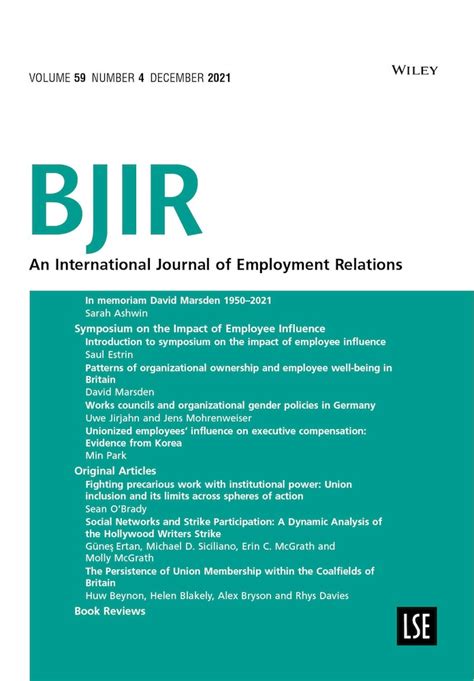
Uncovered Workers in Plants Covered by Collective Bargaining: Who Are They and How Do They Fare?
in: British Journal of Industrial Relations, No. 4, 2022
Abstract
Abstract In Germany, employers used to pay union members and non-members in a plant the same union wage in order to prevent workers from joining unions. Using recent administrative data, we investigate which workers in firms covered by collective bargaining agreements still individually benefit from these union agreements, which workers are not covered anymore and what this means for their wages. We show that about 9 per cent of workers in plants with collective agreements do not enjoy individual coverage (and thus the union wage) anymore. Econometric analyses with unconditional quantile regressions and firm-fixed-effects estimations demonstrate that not being individually covered by a collective agreement has serious wage implications for most workers. Low-wage non-union workers and those at low hierarchy levels particularly suffer since employers abstain from extending union wages to them in order to pay lower wages. This jeopardizes unions' goal of protecting all disadvantaged workers.
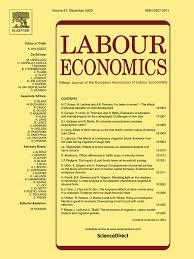
The Gender Reveal: The Effect of Sons on Young Fathers’ Criminal Behavior and Labor Market Activities
in: Labour Economics, October 2022
Abstract
Based on New Zealand’s administrative court charges data, we document child gender-specific differences in future criminal behavior of young fathers. The deterrent impact of having a son on the future likelihood of receiving convictions persists for as long as ten years post-childbirth. Utilizing population-wide monthly tax registers and Census data, we provide key insights into the role model hypothesis. We show that young fathers with a son have (i) a higher likelihood of being in employment, (ii) higher wages and salaries, (iii) lower benefit dependency, (iv) better qualification, and (v) a higher likelihood of being in a partnered relationship.
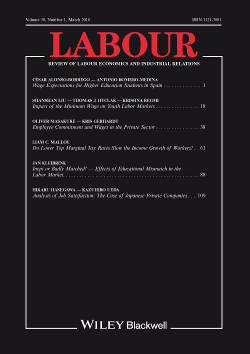
Non-base Compensation and the Gender Pay Gap
in: LABOUR: Review of Labour Economics and Industrial Relations, No. 3, 2022
Abstract
This paper investigates whether non-base compensation contributes to the gender pay gap (GPG). Using administrative data from Germany, we find in wage decompositions that lower bonus payments to women explain about 10 per cent of the gap at the mean and at different quantiles of the unconditional wage distribution whereas the lower prevalence of shift premia and overtime pay among women is unimportant. Among managers, the contribution of bonuses to the mean gap more than doubles and is steadily rising as one moves up the wage distribution. Our findings suggest that gender differences in bonuses are an important contributor to the GPG, particularly in top jobs.
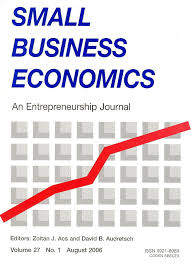
Does Working at a Start-up Pay Off?
in: Small Business Economics, No. 4, 2022
Abstract
Using representative linked employer-employee data for Germany, this paper analyzes short- and long-run differences in labor market performance of workers joining start-ups instead of incumbent firms. Applying entropy balancing and following individuals over ten years, we find huge and long-lasting drawbacks from entering a start-up in terms of wages, yearly income, and (un)employment. These disadvantages hold for all groups of workers and types of start-ups analyzed. Although our analysis of different subsequent career paths highlights important heterogeneities, it does not reveal any strategy through which workers joining start-ups can catch up with the income of similar workers entering incumbent firms.
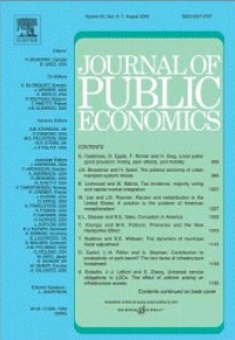
The Place-based Effects of Police Stations on Crime: Evidence from Station Closures
in: Journal of Public Economics, March 2022
Abstract
Many countries consolidate their police forces by closing down local police stations. Police stations represent an important and visible aspect of the organization of police forces. We provide novel evidence on the effect of centralizing police offices through the closure of local police stations on crime outcomes. Combining matching with a difference-in-differences specification, we find an increase in reported car theft and burglary in residential properties. Our results are consistent with a negative shift in perceived detection risks and are driven by heterogeneous station characteristics. We can rule out alternative explanations such as incapacitation, crime displacement, and changes in police employment or strategies at the regional level. We argue that criminals are less deterred due to a lower visibility of the local police.
Working Papers
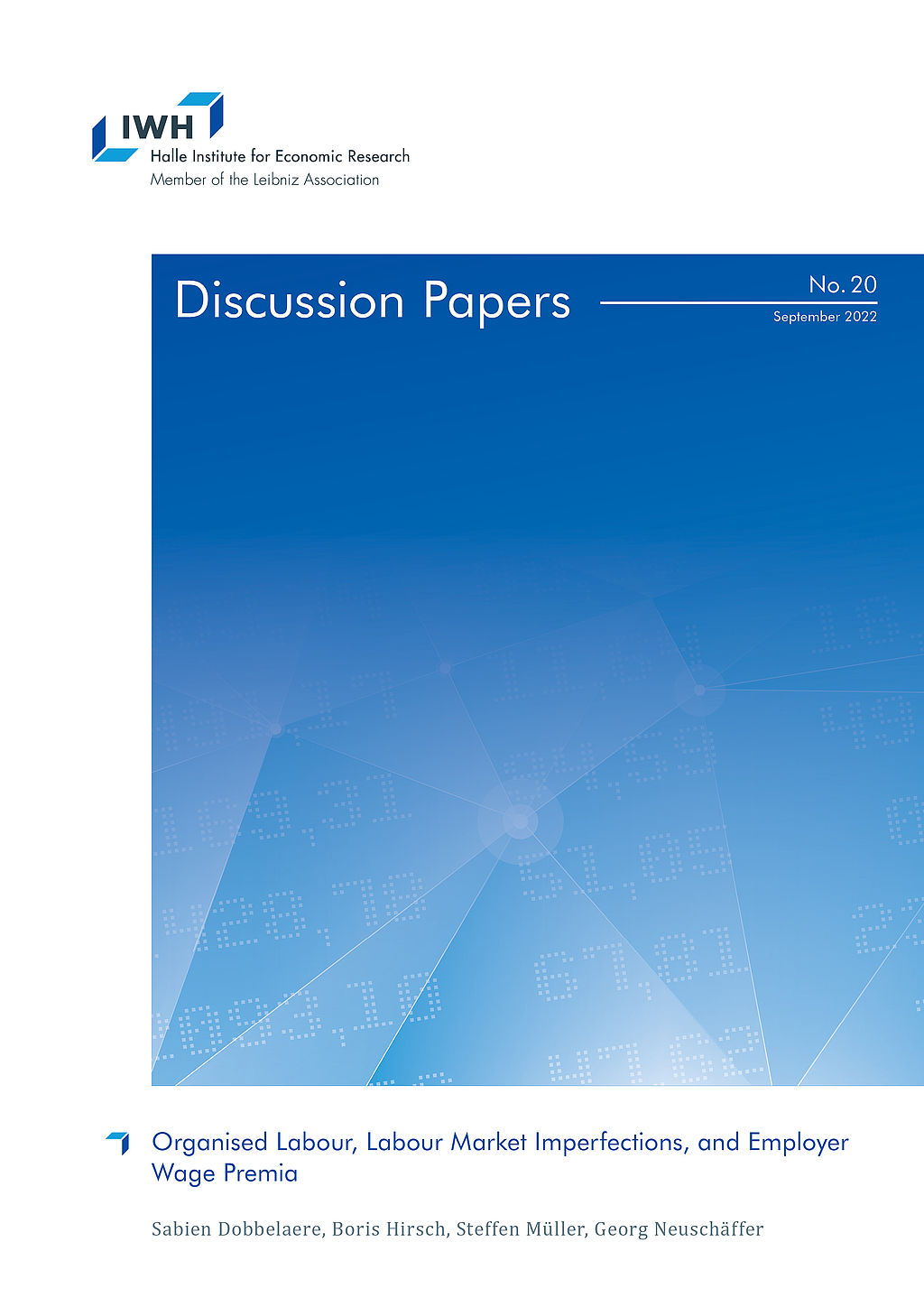
Organised Labour, Labour Market Imperfections, and Employer Wage Premia
in: IWH Discussion Papers, No. 20, 2022
Abstract
This paper examines how collective bargaining through unions and workplace co-determination through works councils relate to labour market imperfections and how labour market imperfections relate to employer wage premia. Based on representative German plant data for the years 1999–2016, we document that 70% of employers pay wages below the marginal revenue product of labour and 30% pay wages above. We further find that the prevalence of wage mark-downs is significantly smaller when organised labour is present and that the ratio of wages to the marginal revenue product of labour is significantly bigger. Finally, we document a close link between labour market imperfections and mean employer wage premia, that is wage differences between employers corrected for worker sorting.
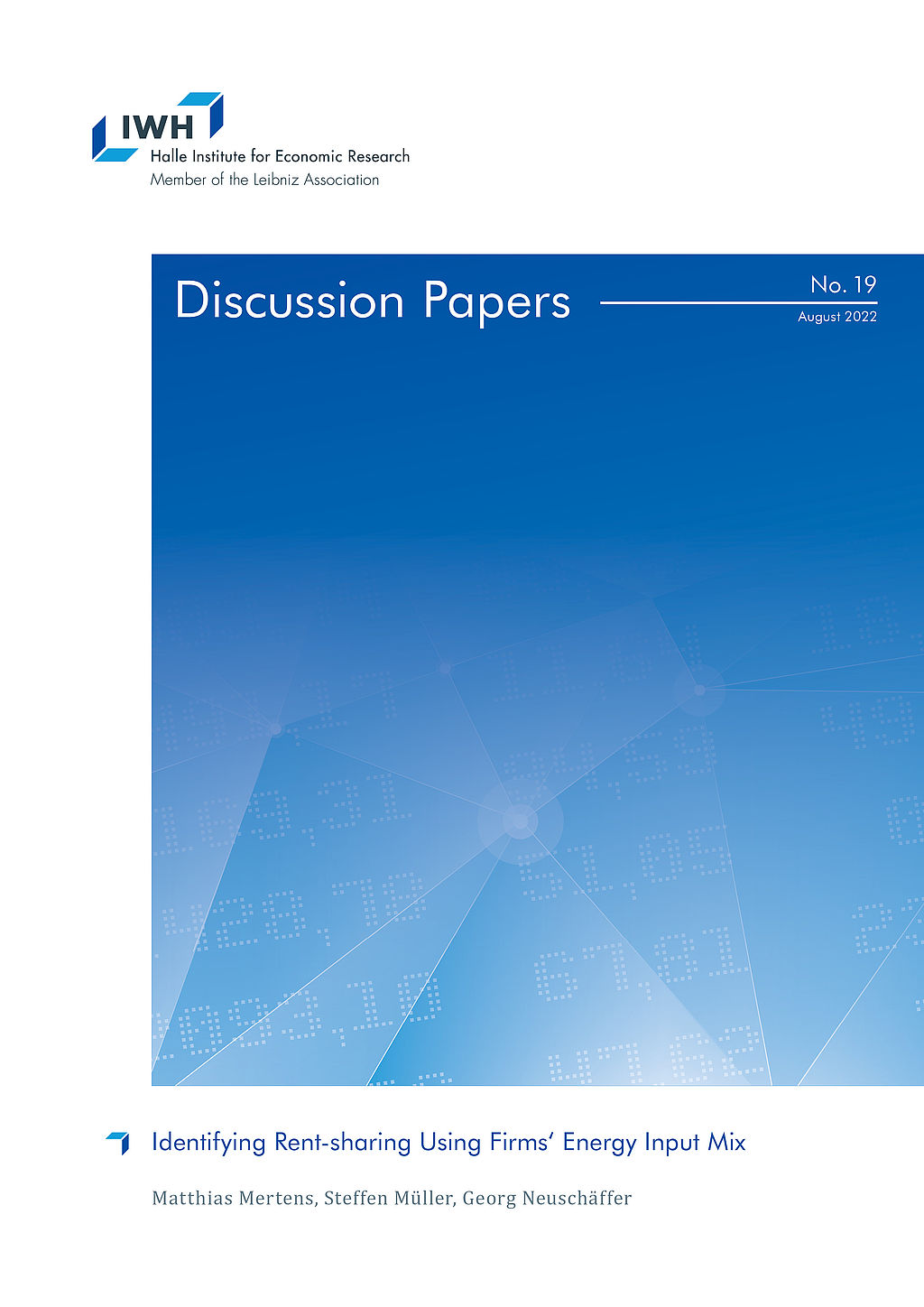
Identifying Rent-sharing Using Firms‘ Energy Input Mix
in: IWH Discussion Papers, No. 19, 2022
Abstract
We present causal evidence on the rent-sharing elasticity of German manufacturing firms. We develop a new firm-level Bartik instrument for firm rents that combines the firms‘ predetermined energy input mix with national energy carrier price changes. Reduced-form evidence shows that higher energy prices depress wages. Instrumental variable estimation yields a rent-sharing elasticity of approximately 0.20. Rent-sharing induced by energy price variation is asymmetric and driven by energy price increases, implying that workers do not benefit from energy price reductions but are harmed by price increases. The rent-sharing elasticity is substantially larger in small (0.26) than in large (0.17) firms.
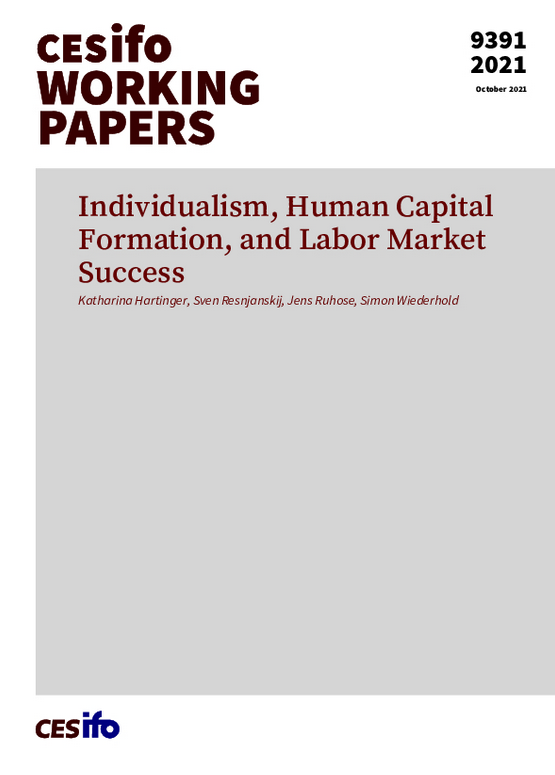
Individualism, Human Capital Formation, and Labor Market Success
in: CESifo Working Paper, No. 9391, 2021
Abstract
There is an ongoing debate about the economic effects of individualism. We establish that individualism leads to better educational and labor market outcomes. Using data from the largest international adult skill assessment, we identify the effects of individualism by exploiting variation between migrants at the origin country, origin language, and person level. Migrants from more individualistic cultures have higher cognitive skills and larger skill gains over time. They also invest more in their skills over the life-cycle, as they acquire more years of schooling and are more likely to participate in adult education activities. In fact, individualism is more important in explaining adult skill formation than any other cultural trait that has been emphasized in previous literature. In the labor market, more individualistic migrants earn higher wages and are less often unemployed. We show that our results cannot be explained by selective migration or omitted origin-country variables.
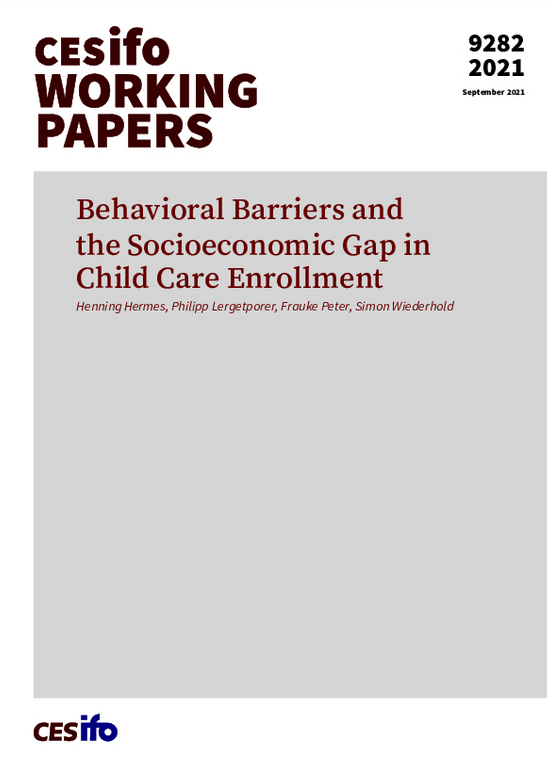
Behavioral Barriers and the Socioeconomic Gap in Child Care Enrollment
in: CESifo Working Paper, No. 9282, 2021
Abstract
Children with lower socioeconomic status (SES) tend to benefit more from early child care, but are substantially less likely to be enrolled. We study whether reducing behavioral barriers in the application process increases enrollment in child care for lower-SES children. In our RCT in Germany with highly subsidized child care (n > 600), treated families receive application information and personal assistance for applications. For lower-SES families, the treatment increases child care application rates by 21 pp and enrollment rates by 16 pp. Higher-SES families are not affected by the treatment. Thus, alleviating behavioral barriers closes half of the SES gap in early child care enrollment.
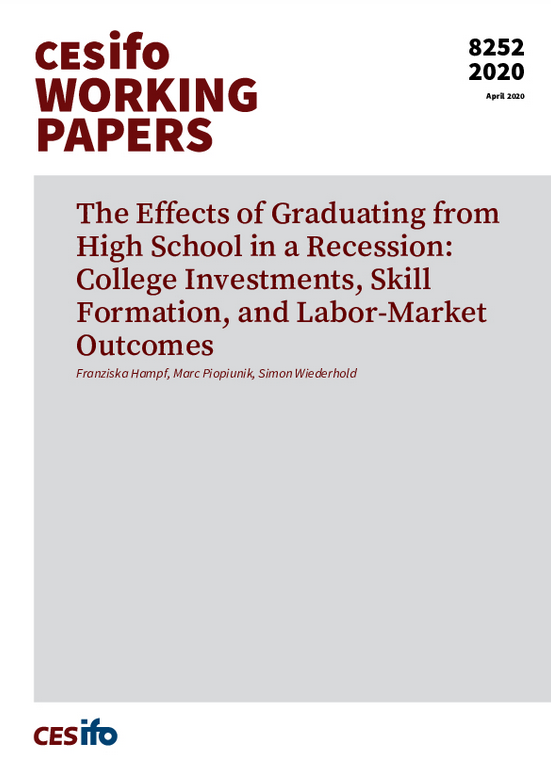
The Effects of Graduating from High School in a Recession: College Investments, Skill Formation, and Labor-Market Outcomes
in: CESifo Working Paper, No. 8252, 2020
Abstract
We investigate the short- and long-term effects of economic conditions at high-school graduation as a source of exogenous variation in the labor-market opportunities of potential college entrants. Exploiting business cycle fluctuations across birth cohorts for 28 developed countries, we find that bad economic conditions at high-school graduation increase college enrollment and graduation. They also affect outcomes in later life, increasing cognitive skills and improving labor-market success. Outcomes are affected only by the economic conditions at high-school graduation, but not by those during earlier or later years. Recessions at high-school graduation narrow the gender gaps in numeracy skills and labor-market success.


















